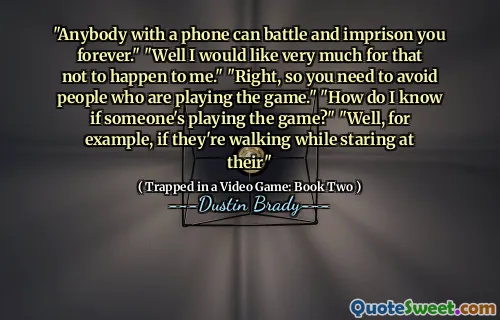
"Anybody with a phone can battle and imprison you forever." "Well I would like very much for that not to happen to me." "Right, so you need to avoid people who are playing the game." "How do I know if someone's playing the game?" "Well, for example, if they're walking while staring at their"
This fragment from Trapped in a Video Game: Book Two by Dustin Brady offers a glimpse into a world where digital conflict has tangible, perhaps permanent, consequences. The idea that "anybody with a phone can battle and imprison you forever" reflects on the omnipresence and potential power of technology in our lives, particularly in the context of games where virtual actions have constant ramifications. There's a palpable anxiety in the dialogue, where the characters are wary of being targeted by others who are fully engrossed in playing the game.
The caution to "avoid people who are playing the game" suggests a metaphor about the dangers of engagement in certain activities that might lead to perpetual entrapment, both digitally and mentally. It raises questions about awareness and vigilance — how can we discern who is involved in these dangerous "games"? The incomplete thought about recognizing players by their behavior, like "walking while staring at their," hints at how engrossed people can become in digital devices, causing them to lose awareness of their surroundings.
Beyond a literal interpretation, this quote metaphorically speaks to the risks of immersion in digital worlds without balance or caution. It warns us about the potential loss of control and autonomy when continuously tethered to digital devices or competitive virtual environments. There’s an implicit message about the importance of self-awareness and critical observation of those around us to avoid falling victim to endless cycles of conflict or imprisonment, whether literal or figurative.
Overall, the extract is a concise yet powerful commentary on the interplay between technology, vigilance, and personal freedom in the digital age.






